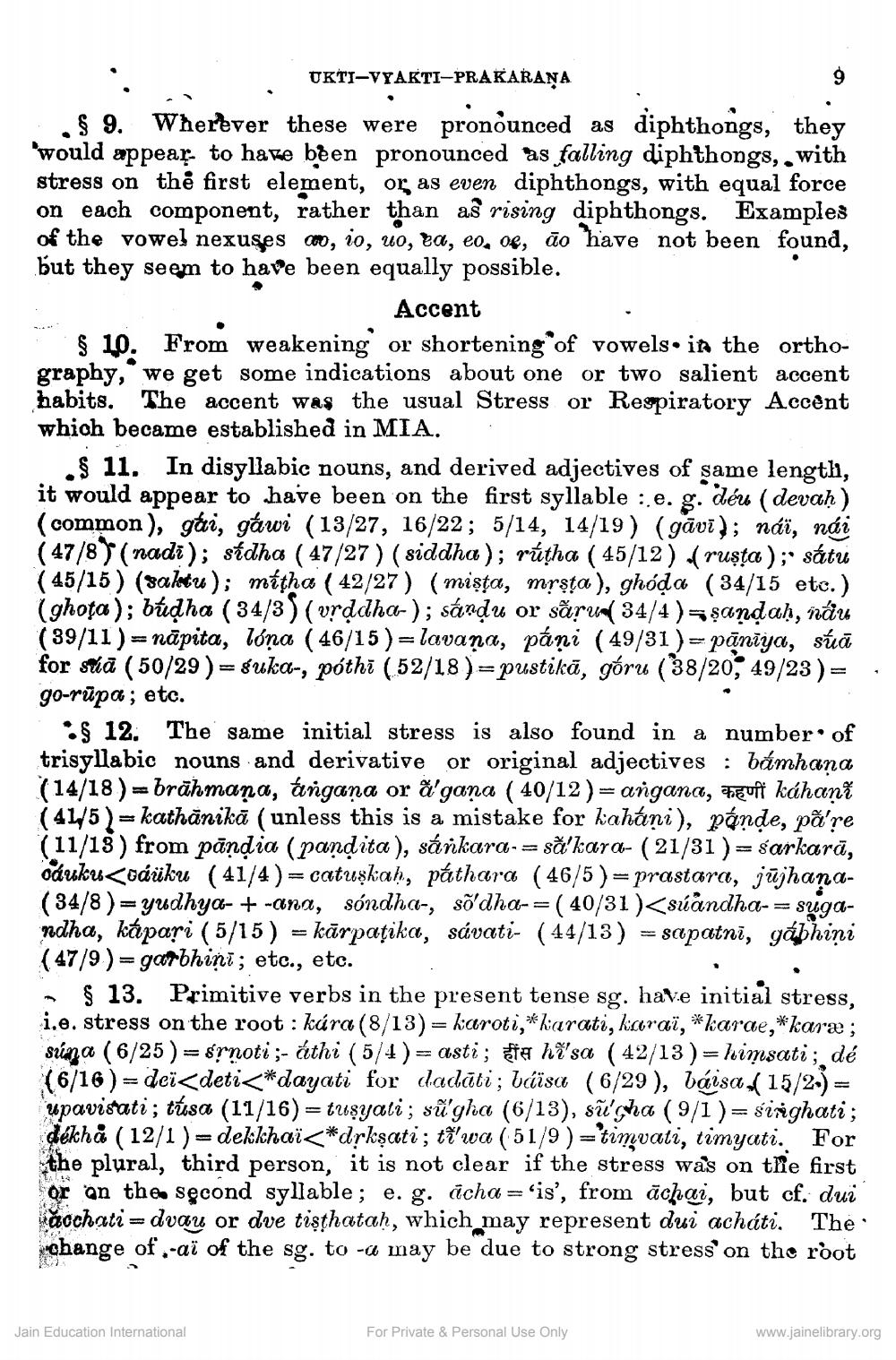________________
UKTI-VYAKTI-PRAKARANA
§ 9. Wherever these were pronounced as diphthongs, they 'would appear to have been pronounced as falling diphthongs, with stress on the first element, or as even diphthongs, with equal force on each component, rather than as rising diphthongs. Examples of the vowel nexuses , io, uo, ta, eo, 06, ão have not been found, but they seem to have been equally possible.
Accent § 10. From weakening or shortening of vowels. in the orthography, we get some indications about one or two salient accent habits. The accent was the usual Stress or Respiratory Accent which became established in MIA.
S 11. In disyllabic nouns, and derived adjectives of same length, it would appear to have been on the first syllable :.e. g. dér ( devaḥ) (common), gái, gáo (13/07, 1622; 5/14, 14/19) (gũoi); mái, mái ( 47/8) (nadi); sídha ( 47/27) (siddha); rútha ( 45/12) .(rusta );: sátu ( 45/15) (sabtu); mítha ( 42/27) (mista, mrşța), ghóda (34/15 etc.) (ghota); búðha ( 34/3) (vrddha-); sándu or sãrual 34/4)=şandaḥ, når (39/11 )= nāpita, lóna ( 46/15)= lavaņa, páni (49/31 )= pāniya, stā for søā (50/29 )= suka-, póthi (52/18)=pustikā, góru (38/20, 49/23 )= go-rupa; etc. .:12. The same initial stress is also found in a number of trisyllabic nouns and derivative or original adjectives : bámhana (14/18 )= brāhmaṇa, ángana or å'gana (40/12)= angana, teuft káhani (41/5) = kathānikā (unless this is a mistake for kaháņi), pánde, pă're (11/18) from pāņdia (pandita), sánkara-= să'kara- (21/31 ) = sarkarā, oduku<odüku ( 41/4)= catuṣkah, páthara ( 46/5)= prastara, jūjhana(34/8)= yudhyo- + -ana, sóndha-, sõ'dha-= ( 40/31)<súandha-= sugandha, kápari (5/15) – kārpaţika, sávati- ( 44/13) = sapatnī, gábhiņi ( 47/9)= garbhinī; etc., etc. * § 13. Primitive verbs in the present tense sg. have initial stress, i.e. stress on the root : kúra (8/13)= karoti, *karati, kurai, *karae, *kara; súna (6/25) = srnoti;- áthi (5/4)= asti; ta hi'sa ( 42/13)=himsati; dé (6/16)= dcï<deti<*dayati for dadāti; büïsa (6/29), báisa. 15/2.) = upavisati; ttisa (11/16)= tusyali; sü'gha (6/13), sū'sha (9/1 )= singhati; dékhå (12/1 )= dekkhaï<*drksati ; tiwa ( 51/9 ) = timvati, timyati. For the plural, third person, it is not clear if the stress was on the first or on the second syllable; e. g. acha="is’, from āchai, but cf. dui kaochati = dvau or dve tişthatah, which may represent dui acháti. The change of -aï of the sg. to -a may be due to strong stress' on the root
Jain Education International
For Private & Personal Use Only
www.jainelibrary.org




